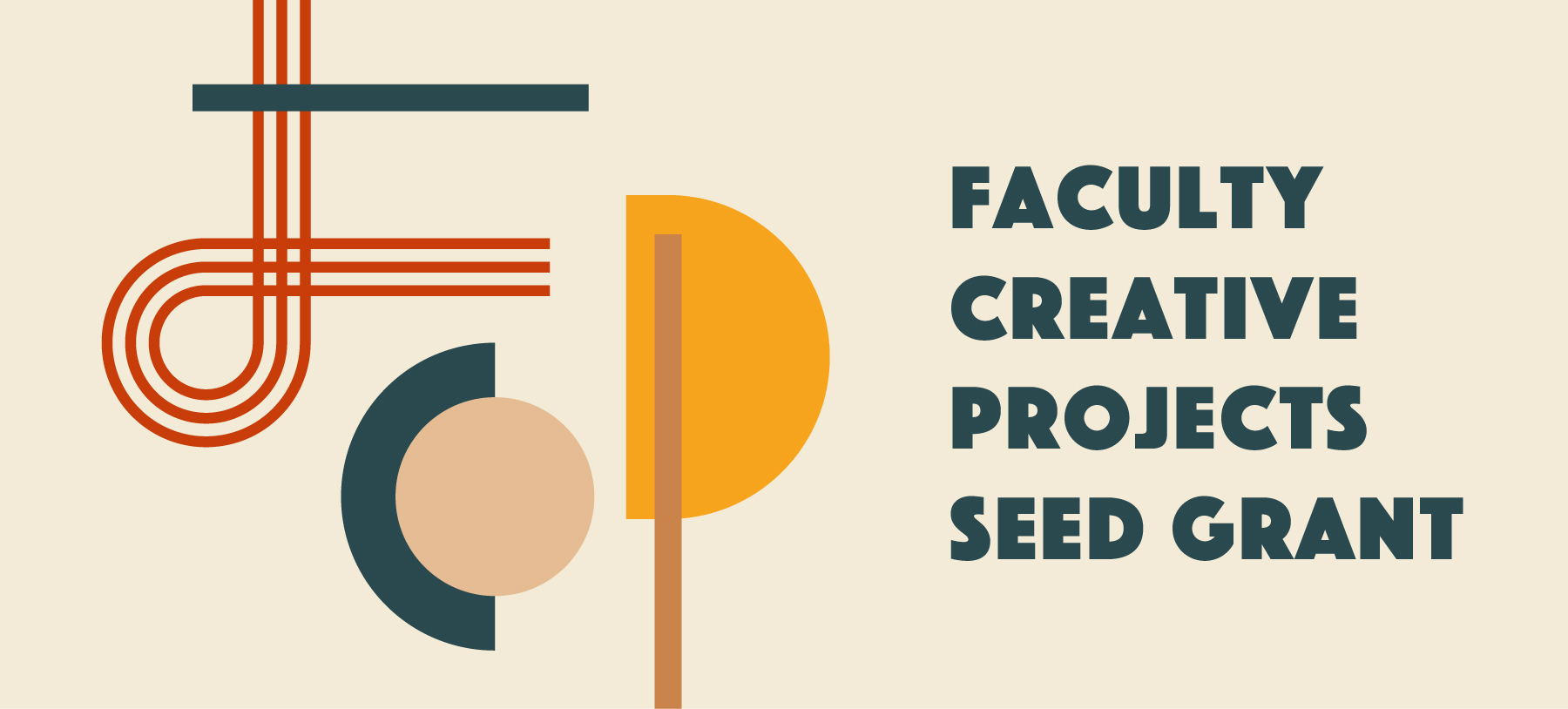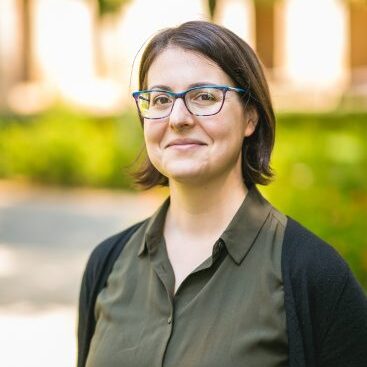
Faculty Creative Project Seed Grant – How to Apply
How to Apply
Purpose
The Office of the Vice President for the Arts is pleased to offer grants to support faculty creative projects with significant impact on campus and beyond.
Not sure if this grant is the best fit for your project? View our comparison guide for guidance.
Application Timeline
- Application Opens: March 1
- Application Deadline: April 15 @ 11:59pm
- Award(s) Announced: mid-May
- Grant Period:
- Begins Sept 1, 2024
- Ends either August 31, 2025 or August 31, 2026, depending on project timeline
Criteria
Proposals can be for projects that are already in the works, or can be used to launch new projects. We are happy to consider proposals in any creative arts discipline, including, but not limited to: the performing arts, the visual arts, creative writing, film, multimedia arts, and heritage arts. We will prioritize projects that work towards the presentation in a public forum (gallery exhibition, screenings, performances, etc.) during the grant period.
Grants range from $10,000-$20,000. Each grant is for a two-year term; shorter terms may be considered depending on the applicant's University appointment terms and/or project needs. Grant recipients have the possibility of requesting approval for a one-year extension based on unforeseen circumstances.
These grants are appropriate for faculty who are artists and artist-scholars working across disciplines; however, the central output must be a creative work (not a scholarly publication, symposium, etc.). Applicants should have an active creative practice that is connected to their University teaching and research.
Proposals should connect projects in question (be they new projects, or existing projects that are being expanded) to an applicant’s overall body of creative work. Funds can be used for any portion of the project lifecycle.
We anticipate that this program will be offered annually for at least three fiscal years (2023, 2024, 2025.) Program criteria and eligibility may differ between cycles as we iterate on the program design based on applicant feedback.
Use of Funds
Grant funds can be used for the following:
- Travel support
- Compensating key collaborators (including Stanford affiliates)
- Materials and equipment
- Organizing public exhibitions/performances/workshops relating to the project
- Hiring research assistants and/or apprentices
- Salary payments for the PI
These grants are not intended for the following:
- Supporting departmental productions & exhibitions
- Analytical or interpretive works (such as scholarly publications, symposia, conferences, panels)
- Consider the Humanities Seed Grants from the Changing Human Experience.
- Bringing visiting artists or scholars to Stanford for academic engagements
- Consider the Denning Visiting Artist Fund from the Office of the Vice President for the Arts
- Emerging artists seeking funds for small-scale projects
- Consider the Burt McMurtry Arts Initiatives Fund from the Office of the Vice President for the Arts
All activities must be in accordance with current University travel and safety policies. For more information, visit:
Selection Criteria
- Project’s connection to applicant’s current creative practice.
- How the project can attain visibility and engage an audience beyond the academy.
- Opportunities for future exhibition/presentation beyond the grant lifecycle.
- Demonstration of a reasonable plan of action for the creative project and its dissemination, and specify a budget that clearly shows how the funding will be used.
Eligibility
- Open to Academic Council (of any rank) and Senior Lecturers.
- Priority may be given to artists and artist-scholars with appointments in the following departments: Department of Art & Art History, Program in Creative Writing, Department of Music, Department of Theater & Performance Studies.
How to Apply
Applications will only be accepted via Seed Funding and must include the following:
- Applicant info
- CVs for all PIs and key external collaborators
- Project summary (up to 128 characters)
- 2-3 page project proposal (PDF)
- Project timeline (PDF)
- Itemized Budget (PDF)
- FYI: OVPA will cover the cost of ISC so grant recipients receive the full amount of their award.
- Expectation Agreement
We strongly encourage you to review your budget and research plans with your DFO/Department Manager/Grants manager in your department/center to make sure they are in keeping with university norms.
Expectations for Funded Projects
- These grants are considered University Research Awards and are subject to the University's research policies.
- VPA will transfer grant funds to your department/program. We ask that you work with your department/program financial administrator to process all logistics and transactions relating to the proposed activity, and to ensure that all transactions and activities adhere to University policies.
- We may award partial grants. In these situations we encourage the recipient to work with your department to identify additional funds to support your project.
- All grant recipients are required to submit the following reports:
- An informal midpoint progress report halfway through your grant period.
- Upon completion of your project, please submit a final report summarizing the project, outcomes, and response. The report is due within 1 month of completing your project. Grant recipients are encouraged, but not required, to include photos (with photographer credit) from the activity as part of their report.
- We may ask grant recipients to participate in a review committee for future grant cycles.
- Awards via one funding stream cannot be combined with any other grants from the Office of the Vice Presidency for the Arts (e.g. artsCatalyst, Off the Farm, Burt McMurtry Arts Initiative Fund, Powers Performing Arts Fund, Denning Visiting Artist Fund, Faculty Creative Project Seed Grant, other VPA co-sponsorship or discretionary grants, etc.) or the Humanities Seed Grant from the Changing Human Experience.
- If the project/activity is no longer taking place, please notify Sabrina Wilensky to discuss next steps.

Contact:
Sabrina Wilensky (she/her)
Director of Program Operations and Project Management
Office of the Vice President for the Arts
swilensk@stanford.edu
Applicant Eligibility
Q: Can I apply as an individual?
A: Yes. Individual Stanford faculty can apply for this grant. You do not need to apply with a team.
Q: I am planning on working with collaborators outside of Stanford. Is this allowed?
A: Yes. While the PI must be a Stanford faculty member, external collaborators are permitted. You will need to submit CVs for all key collaborators as part of your application.
Please discuss your plans and project team with your DFO/Department Manager/Grants manager in your department/center to make sure they’re in keeping with university norms.
Q: I am appointed to the University Medical Line. Am I eligible?
A: No. UML are not part of the Academic Council (SoM Faculty Handbook 2.1-2.2). We encourage you to explore the Burt McMurtry Arts Initiatives Fund as an alternative funding source for your project.
Use of Grant Funds
Q: I would like to include student researchers as part of my project. Is this allowed?
A: Yes. Grant funds can be used for compensating key collaborators (regardless of whether they’re Stanford affiliates). Please discuss your plans and project team with your DFO/Department Manager/Grants manager in your department/center to make sure they’re in keeping with university norms.
Q: I am collaborating with an artist outside of Stanford and would like to bring my collaborator to campus for a residency. Is this allowed?
A: As long as the primary purpose of the grant is not for the residency, then your collaborator’s costs can be covered by a portion of your grant funds. The focus of this grant is on a Stanford faculty member’s specific practice. Please discuss your plans and project team with your DFO/Department Manager/Grants manager in your department/center to make sure they’re in keeping with university norms. If you are primarily seeking funds for a visiting artist, you are encouraged to explore other campus opportunities, such as the Denning Visiting Artist Fund. Contact Ellen Oh for additional information about campus visiting artist programs.
Q: Will receipt of this grant give me priority access to exhibition or performance space on campus?
A: No; grant recipients will need to work directly with campus program staff and venue managers if on-campus presentation is a desired component of the project plan.
Project Eligibility
Q: I am a scholar in a non-arts field and would like to make a documentary and/or podcast about my research. Is my project eligible?
A: If documentary film is part of your standard research methodology then the project would be eligible. However, if this is the first time you’re embarking on a documentary project we would recommend applying to the Burt McMurtry Arts Initiatives Fund to support your exploration of the medium and/or develop a proof-of-concept for the project.
Q: I am a scholar in a non-arts field and do not regularly use the arts as part of my research. However, I have an active creative practice outside of my teaching and research duties. Would my project be eligible for this grant?
A: No; we are only considering projects that have a direct connection to a faculty member’s teaching and/or research. If you are interested in exploring the integration of your creative practice into your research, you are encouraged to explore the Burt McMurtry Arts Initiatives Fund as a way of developing a proof-of-concept.
Q: Does the project need to be interdisciplinary?
A: No; projects can be situated within one core discipline if it’s appropriate for the work. However, interdisciplinary projects are also eligible.
Q: Is it possible to apply for both the Faculty Creative Project Seed Grant and the Burt McMurtry Arts Initiatives Fund with the same project?
A: Yes, however, projects cannot receive both grants concurrently. We recommend staggering your applications and applying for each opportunity in different cycles. For example, you might want to first apply for the Burt McMurtry Arts Initiatives Fund to support a pilot of your project, then apply for the Faculty Creative Project Seed Grant to support the next phase.
Q: Am I still eligible if my project doesn’t require the full two year grant period?
A: Yes. Projects do not need to use the entire grant term.
Q: How do I know if my project is research & discovery, proof-of-concept, or last mile funding?
A: Use the following definitions to guide your selection. Choose the option that is the best fit/alignment for your proposal.
- Research & Discovery: Grant will support faculty time, materials, and other related expenses to prepare for future phases of the project.
- Proof-of-Concept: Initial research and conceptual work is complete, project is ready to be workshopped/prototyped.
- Last Mile Funding: Grant will provide the last remaining piece of funding to bring the full project to fruition.
